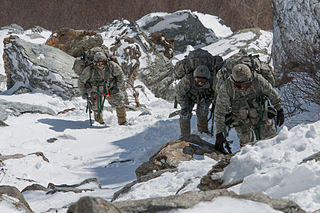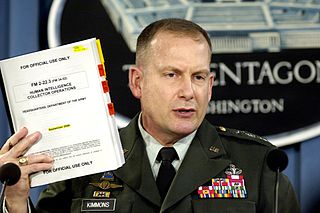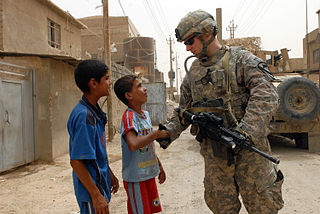Related Research Articles

A Provincial Reconstruction Team (PRT) was a unit introduced by the United States government, consisting of military officers, diplomats, and reconstruction subject matter experts, working to support reconstruction efforts in unstable states. PRTs were first established in Afghanistan in early 2002, and were used in Iraq as well. While the concepts are similar, PRTs in Afghanistan and Iraq had separate compositions and missions. Their common purpose, however, was to empower local governments to govern their constituents more effectively.

An insurgency is a violent, armed rebellion by small, lightly armed bands who practice guerrilla warfare against a larger authority. The key descriptive feature of insurgency is its asymmetric nature: small irregular forces face a large, well-equipped, regular military force state adversary. Due to this asymmetry, insurgents avoid large-scale direct battles, opting instead to blend in with the civilian population where they gradually expand territorial control and military forces. Insurgency frequently hinges on control of and collaboration with local populations.

Counterinsurgency is "the totality of actions aimed at defeating irregular forces". The Oxford English Dictionary defines counterinsurgency as any "military or political action taken against the activities of guerrillas or revolutionaries" and can be considered war by a state against a non-state adversary. Insurgency and counterinsurgency campaigns have been waged since ancient history. However, modern thinking on counterinsurgency was developed during decolonization.

Mountain warfare or alpine warfare is warfare in mountains or similarly rough terrain. The term encompasses military operations affected by the terrain, hazards, and factors of combat and movement through rough terrain, as well as the strategies and tactics used by military forces in these situations and environments.
Steven Kent Metz is an American author and former professor of national security and strategy at the U.S. Army War College specializing in insurgency and counterinsurgency, American defense policy, strategic theory, the African security environment, and future warfare.

United States Army Field Manuals are published by the United States Army's Army Publishing Directorate. They contain detailed information and how-tos for procedures important to soldiers serving in the field.

David Galula was a French military officer and scholar who was influential in developing the theory and practice of counterinsurgency warfare.

The Battle of Tal Afar also known as Operation Restoring Rights was a military offensive conducted by the United States Army and supported by Iraqi forces, to eliminate Al Qaeda in Iraq and other insurgents in the city of Tal Afar, Iraq in response to the increase of insurgent attacks against U.S. and Iraqi positions in the area and to end the brutal tactics against the population by the terrorists. Coalition Forces consisted of 3rd Armored Cavalry Regiment, elements of the 82nd Airborne Division, and two brigades of the Iraqi 3rd Division, all were under the command of Col. H.R. McMaster. AQI had used the city as a staging ground for moving foreign fighters into Iraq since early 2005. The city was temporarily cleared for elections in 2005, but was not secured in a long-term view.

David John Kilcullen FRGS is an Australian author, strategist, and counterinsurgency expert and current president of the Cordillera Applications Group. Previously he served as non-executive chairman of Caerus Associates, a strategy and design consulting firm that he founded. He is a professor at Arizona State University and at University of New South Wales, Canberra.

Foreign internal defense (FID) is a term used by the military in several countries, including the United States, France and the United Kingdom, to describe an integrated or multi-country approach to combating actual or threatened insurgency in a foreign state. This foreign state is known as the Host Nation (HN) under the US doctrine. The term counter-insurgency is commonly used for FID.
A clandestine cell system is a method for organizing a group of people, such as resistance fighters, spies, mercenaries, organized crime members, or terrorists, to make it harder for police, military or other hostile groups to catch them. In a cell structure, each cell consists of a relatively small number of people, who know little to no information concerning organization assets beyond their cell. This limits the harm that can be done to the organization as a whole by any individual cell member defecting, being a mole, being surveilled, or giving up information after being apprehended and interrogated.

A variety of models for understanding insurgency and planning the counterinsurgency (COIN) response have been developed. One model that has become respected both in academic and military context is the "Magic Diamond" model developed by Gordon McCormick of the RAND Corporation. The model involved four key elements or players, with mirrored strategies for their interactions. Each element will have a "mirrored" strategy, in which the way in which it imposes or aids insurgency is one image, and where the way that it interacts with counterinsurgency is the reflection.
A logical line of operation (LLO) is an obsolete American military doctrinal concept. It was originally used along with the separate term line of operation which described a geographic line from a base of operations to a military objective. The qualifier "logical" indicated the pursuit of military objectives that did not necessarily require a physical or geographic description, such as governance capacity-building and development activities.

Douglas Ollivant is a Senior National Security Studies Fellow at the New America Foundation as well as a Managing Partner at Mantid International. Ollivant previously served as a senior counterinsurgency (COIN) advisor to Regional Command East, as part of the International Security Assistance Force COIN Advisory and Assistance Team. He served as Director for Iraq on the National Security Council under the Bush and Obama administrations. A retired U.S. Army officer, he served two tours in the Iraq War, first as the operations officer for the First Battalion, Fifth Cavalry Regiment during OIF II and later as the Chief of Plans for Multi-National Division-Baghdad during the “Surge”, leading the team which wrote the Baghdad Security Plan.
Montgomery McFate is a cultural anthropologist, a defense and national security analyst, and former Science Advisor to the United States Army Human Terrain System program. As of 2011, she holds the Minerva Chair at the U.S. Naval War College.
James Sterling Corum is an American air power historian and scholar of counter-insurgency. He has written several books on counterinsurgency and other topics. He is a retired lieutenant colonel in the US Army Reserve.

Cordon and search is a military tactic to cordon off an area and search the premises for weapons or insurgents. It is one of the basic counterinsurgency operations. Two types of cordon and search operations are cordon and knock and cordon and kick.

Gian P. Gentile is a retired US Army colonel, who served for many years as a history professor at the United States Military Academy at West Point. Gentile has also been a visiting fellow at the Council on Foreign Relations and a senior historian at the RAND Corporation. He is a leading critic of U.S. military counter-insurgency doctrine.
Clear and hold is a counter-insurgency strategy in which military personnel clear an area of guerrillas or other insurgents, and then keep the area clear of insurgents while winning the support of the populace for the government and its policies. As defined by the United States Army, "clear and hold" contains three elements: civil-military operations, combat operations, and information warfare. Only highly strategic areas are initially chosen for "clear and hold" operations; once they are secure, the operation gradually spreads to less strategic areas until the desired geographic unit is under control. Once an area has been cleared, local police authority is re-established, and government authority re-asserted.

Winning hearts and minds is a concept occasionally expressed in the resolution of war, insurgency, and other conflicts, in which one side seeks to prevail not by the use of superior force, but by making emotional or intellectual appeals to sway supporters of the other side.
References
- ↑ Adapt: Why Success Always Starts with Failure (2011) p. 62
- ↑ Ruettershof, T. Counterinsurgency as Ideology. University of Exeter; 2015. https://core.ac.uk/download/pdf/43097978.pdf